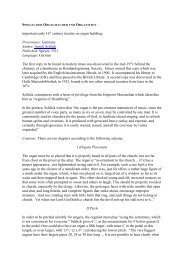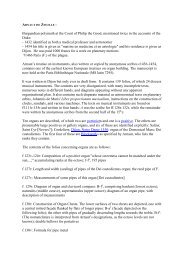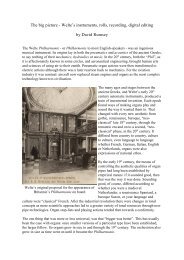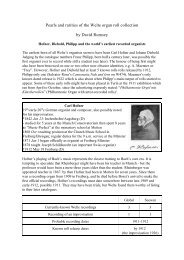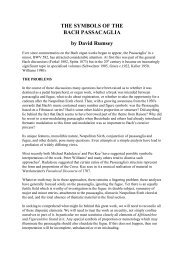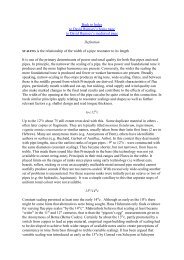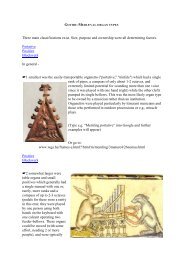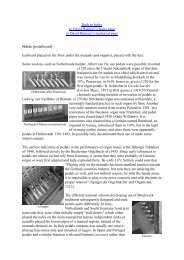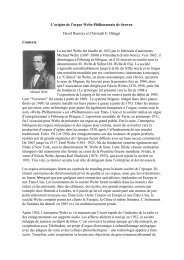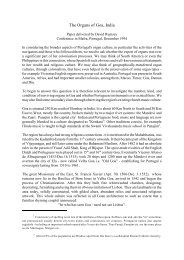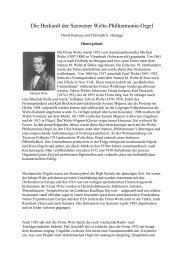Bach and the Holy Trinity - David Rumsey
Bach and the Holy Trinity - David Rumsey
Bach and the Holy Trinity - David Rumsey
Create successful ePaper yourself
Turn your PDF publications into a flip-book with our unique Google optimized e-Paper software.
4<br />
Rhetorical traditions date back to classical Greece - Aristotle, Cicero, Quintilian <strong>and</strong><br />
o<strong>the</strong>rs. But it was <strong>the</strong> German Reformation that provided special links between rhetoric<br />
<strong>and</strong> music. Lu<strong>the</strong>r encouraged <strong>the</strong> concept that music was not merely a beautiful art form,<br />
but ranked “next to <strong>the</strong>ology”. During <strong>the</strong> Renaissance music began to shift from a<br />
ma<strong>the</strong>matical discipline (where it had co-existed with astronomy, ma<strong>the</strong>matics, <strong>and</strong><br />
geometry in <strong>the</strong> quadrivium of <strong>the</strong> seven liberal arts) to <strong>the</strong> predominantly linguistic <strong>and</strong><br />
humanistic disciplines associated with <strong>the</strong> trivium (logic, grammar, <strong>and</strong> rhetoric). As early<br />
as 1537 we have written evidence of Lu<strong>the</strong>ran connections between rhetoric <strong>and</strong> music<br />
in a textbook, Musica, for use in German classrooms. It was written by Nicolaus<br />
Listenius, a Wittenberg schoolmaster. Direct evidence of <strong>Bach</strong>’s links with rhetorical<br />
practice <strong>and</strong> its application to music, exist inter alia in his friendship with Abraham<br />
Birnbaum, instructor in rhetoric at <strong>the</strong> University of Leipzig.<br />
Thus Lu<strong>the</strong>ranism evolved a strong equality between bible <strong>and</strong> hymn-book, between<br />
Pastor <strong>and</strong> Cantor in <strong>the</strong> ecclesiastical culture of this era. A Cantor such as <strong>Bach</strong> would<br />
have seen himself, <strong>and</strong> been seen, as a kind of musical Pastor, with equal authority <strong>and</strong><br />
responsibility: <strong>the</strong> religious message <strong>and</strong> leadership was <strong>the</strong> same, <strong>the</strong> rhetoric of <strong>the</strong><br />
preaching <strong>the</strong> same, but <strong>the</strong> medium was music ra<strong>the</strong>r than speech.<br />
In that connection <strong>and</strong> in this culture we can observe <strong>Bach</strong>’s musical preaching as not<br />
only <strong>the</strong> week-by-week duties of creating <strong>and</strong> performing music for <strong>the</strong> services, but from<br />
time to time issuing great statements of faith literally speaking through his music, a<br />
preaching <strong>and</strong> teaching medium appropriate for a Cantor. At all stages in his life he<br />
produced monumental statements of this kind:<br />
Liturgy (b-minor mass 1730's)<br />
Church Seasons (Christmas - Canonic Variations, Christmas Oratorio; Easter -<br />
Easter Oratorio, Passion: Johannes, Matthäus <strong>and</strong> o<strong>the</strong>rs, now lost).<br />
Organ Music was a naturally favoured medium for this kind of activity:<br />
Orgelbüchlein of 1717, Schübler of 1747, <strong>the</strong> “Eighteen Chorales”, <strong>the</strong><br />
Passacaglia an early essay into Covenant Theology, all involve strong<br />
liturgical <strong>and</strong>/or doctrinal <strong>and</strong> <strong>the</strong>ological considerations.<br />
Indeed it would have been strange had he not, in this lifetime of musical preaching,<br />
dedicated something major to <strong>the</strong> <strong>Holy</strong> <strong>Trinity</strong>.<br />
Not that <strong>the</strong> <strong>Trinity</strong> went unacknowledged: we find a few references to Trinitarianism as<br />
such in many of his works. Elements appear in <strong>the</strong> earlier works, such as Orgelbüchlein,<br />
some of <strong>the</strong> Cantatas, <strong>the</strong> extant Passions, <strong>the</strong> b minor Mass. But it is generally only<br />
insofar as Fa<strong>the</strong>r, Son or <strong>Holy</strong> Ghost are mentioned briefly <strong>and</strong> separately. Cantata 176



